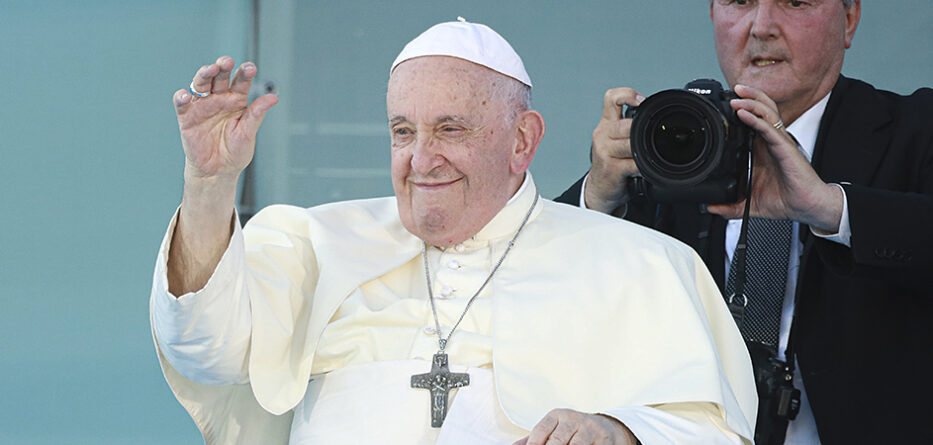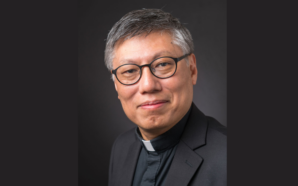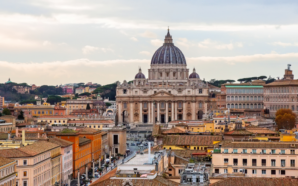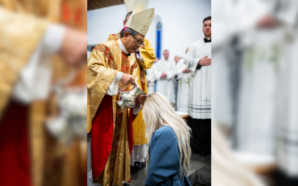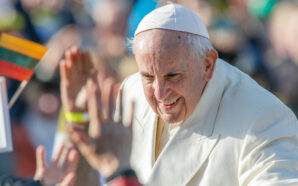Throughout October 2024, Br Mark O’Connor FMS, Vicar for Communications for the Diocese of Parramatta and the Pope Francis Fellow at Newman College, University of Melbourne, will provide reports on the second session of the Synod on Synodality in Rome.
This is his fifth and final letter for Monday October 28th.

Pope Francis with Synod delegates at the conclusion of the Second Session of the Synod. Image: supplied with permission.
Forward steps on the mission, but not a prophetic leap!
First, the Good News. The Synod in Rome has now successfully concluded with the delegates testifying to a great spirit of joy and unity.
Indeed, what an extraordinary process unfolded before our eyes over the last three years! Beginning with a massive global consultation, it included two arduous month-long synods in October 2023 and October 2024.
For the first time, laywomen and men had the same voting rights as bishops. Gathered around round tables, as equals, 368 members – 272 of whom are bishops and 96 non-bishops – engaged in ‘spiritual conversations’. May this method prosper and continue at future synods.
The synodal delegates on Saturday, October 26th concluded this phase of the process of ‘synodal conversion’ yesterday, by voting and publishing a final document to the People of God.
An excellent press conference was then held with Cardinals Hollerich SJ and Grech, which comprised entirely of questions from journalists. I was very impressed overall. This wonderful resulting video of Cardinal Hollerich SJ gave me great hope.
Although I have my hesitations about the value of yet more documents, I must confess this is a fine message (if long at 52 pages) that provides many insights and ways forward for our local churches to further implement Vatican II; I urge you to please study the whole document. So far, it’s only Italian, but please see here for an unofficial English translation that also includes the voting patterns and a summary by Giampaolo Mattei from Vatican News.
For excellent overviews see Christopher White and James Martin SJ‘s pieces, and Austen Ivereigh’s remarks:
Friends: a couple of thoughts from Rome on the final doc and what we were doing here … pic.twitter.com/TbPrXshU1i
— Austen Ivereigh (@austeni) October 27, 2024
A Rocky Roman Road
However, as I indicated in my last letter, it was also a Synod conducted on a rather ‘rocky Roman road’.
It sometimes actually felt like watching someone learning how to drive a car with the foot on both the accelerator and the brake!
Hence the movement forward was real but somehow seemed jerky, even erratic.
That is why I was particularly helped by Geraldine Doogue’s interview with Bishop Shane Mackinlay and Susan Pascoe for Plenary Matters, who as ‘insiders’ give an honest account of the progress of this second session of the Synod on Synodality.
The two issues where the progress was rather spectacularly ‘rocky’ were the questions of women in the church and the future role of episcopal conferences.
The Synod on Women
On the question of women, the synodal final document number 60 is very interesting! It deserves quoting in full:
- By virtue of Baptism, women and men have equal dignity as members of the People of God. However, women continue to encounter obstacles in obtaining a fuller recognition of their charisms, vocation and roles in all the various areas of the Church’s life. This is to the detriment of serving the Church’s shared mission. Scripture attests to the prominent role of many women in the history of salvation. One woman, Mary Magdalene, was given the first proclamation of the Resurrection. On the day of Pentecost, Mary, the Mother of God, was present, accompanied by many other women who had followed the Lord. It is important that the Scripture passages that relate these stories find adequate space inside liturgical lectionaries. Crucial turning points in Church history confirm the essential contribution of women moved by the Spirit. Women make up the majority of churchgoers and are often the first witnesses to the faith in families. They are active in the life of small Christian communities and parishes. They run schools, hospitals and shelters. They lead initiatives for reconciliation and promoting human dignity and social justice. Women contribute to theological research and are present in positions of responsibility in Church institutions, in diocesan curias and the Roman Curia. There are women who hold positions of authority and are leaders of their communities. This Assembly asks for full implementation of all the opportunities already provided for in Canon Law with regard to the role of women, particularly in those places where they remain under-explored. There is no reason or impediment that should prevent women from carrying out leadership roles in the Church: what comes from the Holy Spirit cannot be stopped. Additionally, the question of women’s access to diaconal ministry remains open. This discernment needs to continue. The Assembly also asks that more attention be given to the language and images used in preaching, teaching, catechesis, and the drafting of official Church documents, giving more space to the contributions of female saints, theologians and mystics.
It is to be noted that Cardinal Hollerich explicitly pointed out that Pope Francis has blessed this whole document and made it his own – including the phrase ‘Additionally, the question of women’s access to diaconal ministry remains open. This discernment needs to continue.’
Nonetheless, one veteran Vatican reporter did make this sharp comment on the voting for it. ‘This rather mild proposal received 98 votes against, the most of any issue, highlighting the still deeply ingrained misogyny in the Catholic Church.’
Fears and hopes for Episcopal Conferences
There was also considerable controversy over the question of the role of episcopal conferences. Some fear the splintering of church doctrine and its relativisation but others see important developments for the good of the church as long as the local and the universal church are in union and harmony. This debate is well summarised here by Vimal Tirimanna.
Stay tuned
Readers in Australia will have a chance to meet and dialogue with three important voices from this Global Synod who will be guests of the Diocese of Parramatta for the Bishop Vincent Presents Series and the Melbourne Newman Helder Camara Lecture Series in 2025.
Feb/March 2025: Mauricio Lopez
In late February/March 2025 come and learn more about global Catholicism and its challenges with Mauricio López Oropeza.
Mauricio is Mexican by birth, Ecuadorian by choice, and Amazonian by vocation. He is the former world president (2013-2018) and member of Christian Life Community CLC. Mauricio is now Executive Secretary of CEAMA (Conferencia Eclesial de la Amazonía/Ecclesial Conference of the Amazon) which is working to implement the proposals of the Amazon Synod. In 2021, he was appointed by Pope Francis as a member of the Vatican Dicastery for Promoting Integral Human Development.
May 2025: Cardinal Stephen Chow SJ
In May 2025 Cardinal Stephen Chow SJ, Bishop of Hong Kong will also visit us, read here for further background.
August 2025: Dr Nora Kofognotera Nonterah
And finally, from Africa in August 2025 Dr Nora Kofognotera Nonterah, a Ghanaian lay woman Theologian and Synod voting member will be joining us.
More details about these three visits will be shared in early 2025 via Catholic Outlook.
CONCLUSION: What comes from the Holy Spirit cannot be stopped
In such a complex global church, how synodality is going to be further implemented and enculturated will mean a variety of responses for the various diverse local churches.
But as Number 60 of the final document says so beautifully, one thing is certain about the future: ‘What comes from the Holy Spirit cannot be stopped’.
But what of our Australian church’s direction?
There are some leaders in the Church here who believe that the central issues confronting the People of God in Australia that demand priority are: pro-life issues, religious freedom and what they see as the increasing threat of secularisation.
They have a good point. But it’s never either/or but, both/and in a healthy Catholic church.
Others suggest a complementary pastoral strategy to the above, that also seeks to follow the synodal path of Pope Francis and calls on disciples to joyfully reach out to the marginalised and accompany them. The plight of our environment, refugees, Indigenous peoples, and all those who feel excluded, weigh heavily on the consciences of these people. Their path energises the prophetic imagination of the pilgrim People of God through dialogue. It does not confront secularisation so much as an ‘enemy’ but rather wants to encounter and accompany those who struggle to believe.
Of course, how synodality is actually implemented in our local church is a conversation that must go on. The Plenary Council was just a beginning.
In conclusion, five years of reporting on the Amazon Synod and two sessions of the Synod on Synodality, leave me with one abiding impression:
We have been given a great gift of the Holy Spirit in Pope Francis.
As Paul Elie puts it: “Francis has shown us again and again what it means for Catholics and the Church to accompany others. The Francis way of accompaniment is—you meet people where they are. You presume the good in them and hope that they will presume the good in you. You have a conversation. You open your mind and heart: you prepare to learn something from them. You go where they are going, if only for a little while, trusting that something good will come of it. You keep your wits about you, but you don’t let scruples rule you.”
Let’s follow Francis our Pope and accompany others on the journey ahead.




